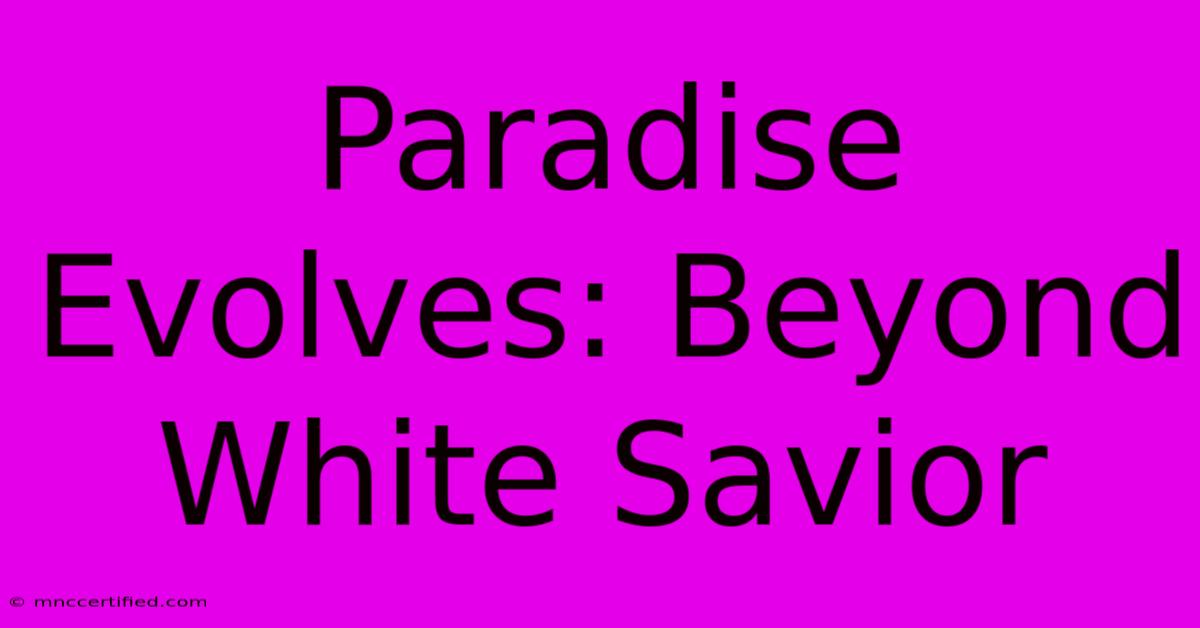Paradise Evolves: Beyond White Savior

Table of Contents
Paradise Evolves: Beyond the White Savior Complex
The idyllic image of paradise, often portrayed as pristine and untouched, frequently comes coupled with a problematic narrative: the white savior complex. This trope, deeply ingrained in media and popular culture, depicts a white protagonist rescuing or "civilizing" a non-white, often impoverished, community. But the reality is far more nuanced, and the time has come to evolve our understanding of paradise and its portrayal. This article will explore how we can move beyond this harmful narrative and create more authentic and respectful representations.
Deconstructing the White Savior Complex
The white savior complex isn't simply a matter of aesthetics; it perpetuates harmful stereotypes and reinforces power imbalances. It positions the white character as superior, inherently capable of solving problems that are often the direct or indirect result of systemic injustices perpetuated by their own culture. This narrative:
- Minimizes the agency of the people being "saved": It reduces individuals and communities to passive recipients of aid, ignoring their resilience, resourcefulness, and existing solutions.
- Perpetuates colonial mentalities: It echoes the historical narrative of Western dominance and the inherent "backwardness" of non-Western cultures.
- Ignores systemic issues: It focuses on individual acts of charity, neglecting the broader systemic issues – poverty, oppression, climate change – that contribute to the challenges faced by these communities.
- Fetishizes other cultures: Often, these narratives exoticize or romanticize the "exotic" cultures being portrayed, reducing their complexities to picturesque backdrops.
Reimagining Paradise: Authentic Representation
Moving beyond the white savior complex requires a conscious effort to shift perspectives and create more authentic narratives. This involves:
- Centering the voices of those impacted: Giving agency to those whose stories are being told is paramount. Instead of external saviors, feature local heroes and community leaders actively working towards solutions. Collaborate with individuals and organizations within the communities depicted.
- Focusing on collaboration, not charity: Highlighting collaborative efforts and mutual respect fosters a more accurate representation of sustainable development and community empowerment.
- Acknowledging systemic inequalities: Address the root causes of the challenges faced by communities, rather than simply offering superficial solutions. Explore themes of colonialism, neocolonialism, and global capitalism's impact on marginalized communities.
- Showcasing diverse leadership: Feature diverse characters from different backgrounds in leadership roles, demonstrating competence and capacity within the community itself.
- Avoiding exoticization and stereotypes: Portray cultures with respect and nuance, avoiding stereotypical depictions and recognizing the diversity within those communities.
Beyond the Binary: A Spectrum of Stories
The concept of "paradise" itself needs re-evaluation. It's not a monolithic ideal, but a spectrum of experiences shaped by culture, geography, and individual perspectives. Instead of focusing on a singular, idealized vision, we should embrace diverse narratives that reflect the complexities of life in different communities.
Case Study: Environmental Activism in Indigenous Communities
For example, instead of a white environmentalist saving a rainforest, we could tell the story of indigenous communities protecting their ancestral lands and fighting for environmental justice. This approach centers the voices of those most impacted and highlights their long history of environmental stewardship.
Practical Steps for Creators
- Research thoroughly: Conduct extensive research and engage in meaningful consultation with communities and experts.
- Seek diverse perspectives: Collaborate with writers, directors, and actors from diverse backgrounds.
- Challenge your own biases: Be conscious of your own preconceptions and actively challenge them.
- Amplify marginalized voices: Prioritize platforms and opportunities for marginalized communities to share their stories.
By actively dismantling the white savior complex and embracing authentic representation, we can move toward a more nuanced and truthful portrayal of paradise – a paradise that reflects the richness, resilience, and agency of all communities. This evolution isn't merely about changing how we tell stories; it's about creating a more just and equitable world.

Thank you for visiting our website wich cover about Paradise Evolves: Beyond White Savior. We hope the information provided has been useful to you. Feel free to contact us if you have any questions or need further assistance. See you next time and dont miss to bookmark.
Featured Posts
-
Commanders Win Despite Daniels Turnovers
Dec 23, 2024
-
Usyk Interview Interrupted By Dubois
Dec 23, 2024
-
Flintoff Opens Up Post Crash
Dec 23, 2024
-
Fury Miserable Post Fight Molly
Dec 23, 2024
-
49ers Playoffs Hopes Dashed
Dec 23, 2024